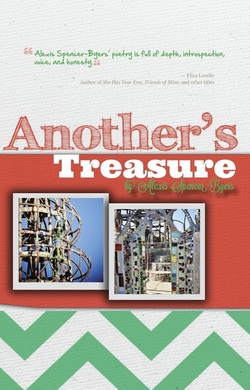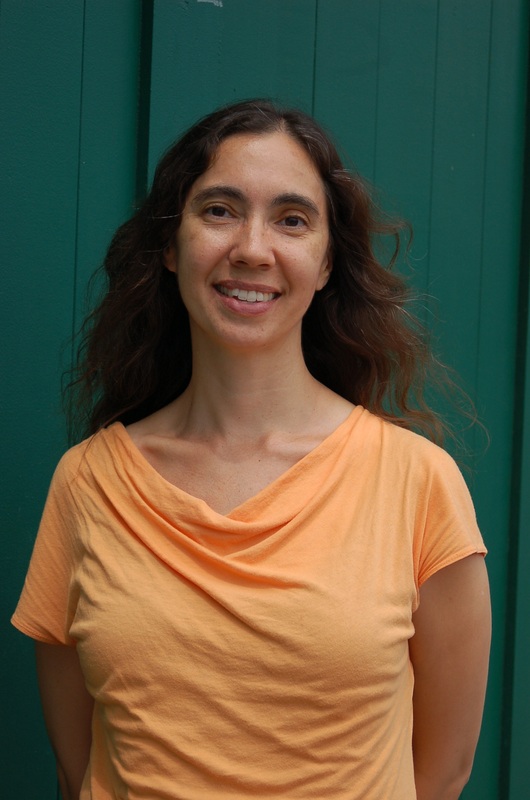|
Readers, I'm thrilled to feature my good friend Alexis Spencer-Byers: poet, screenwriter, and editor. Her first book, Urban Verses, was a collection of poetry and prose that wonderfully captured the frailty and grace of the human spirit. Her latest collection, Another's Treasure, is more mature, more insightful, and more wondrous.
Alexis Spencer-Byers was raised in San Francisco; completed a degree in English at Amherst College in Massachusetts; engaged in various types of community development work in Jackson, Mississippi; and currently lives in Los Angeles, where she works as a church administrator and freelance copy-editor. While in Jackson, she co-founded Koinonia Coffee House, an inner-city café and community gathering place. Meet Alexis, everyone! Q: When did you start writing, and why? What keeps you at it today? A: I started writing in the fourth grade, when my teacher, Mr. Kritikakos, gave the class a short story assignment. We were supposed to imagine that a famous person came to have lunch with us and write about the experience. I chose the royal family of England as my lunch guests—speculating that since Princess Diana and I shared a last name, we were actually distant cousins. This assignment introduced me to the joy of exploring possibilities beyond what I had experienced in my day-to-day life. Later, as I continued to write stories, novels (none published and really all quite bad), and eventually poems, I discovered how wonderful writing was, not just as a way to imagine alternate realities, but as a means of making sense of actual realities. This is its main value to me today—it helps me to process the things I experience, observe, fear, wonder about, etc. As I am not at all talented in more visual arenas (drawing, painting, interior design, etc.), it is also my one shot at contributing something of beauty to the small corner of the world which I inhabit. Q: Tell us a bit more about yourself today. What do you do for a living, what are your hobbies, and when/where do you write? A: My vocational life is a complete hodge-podge at this point. I work part-time as a church administrator and also freelance as a writer/editor/proofreader. On a volunteer basis, I have begun serving with a few organizations in the Los Angeles area that work with incarcerated and formerly incarcerated youth and young adults. Some of these organizations are specifically writing-focused (Street Poets and InsideOUT Writers), and it’s a real joy to see writing provide a means of creative expression, emotional release, and self validation to young people who may never have thought of their voices and stories as having value. Does watching baseball count as a hobby? Because that is how most of my discretionary time has been spent the last few years. [Elisa interjects: Congrats to your San Francisco Giants winning the World Series!] I also enjoy various types of puzzles (jigsaw, crossword, etc.). I mostly write at home (often after jumping quickly out of the shower, because something has suddenly occurred to me as I washed my hair), in the car (I promise I pull over before starting to scribble!), or at Street Poets’ weekly Seeking Peace poetry circles. I confess that I am not disciplined about writing a certain amount at a certain time every day. I mostly allow ideas to show up as they will, although if I notice I’m in a dry spell, I will occasionally sit myself down at a coffee house with a notebook and put myself in a sort of artistic “time out,” from which I am not allowed to emerge until I have written something. Q: Tell us about Another’s Treasure. A: The poems in Another’s Treasure were written over the course of nearly 10 years, but I didn’t start thinking about assembling them into a collection until about 3 years ago. I put together a manuscript over the next year or so, and then sought feedback from a few family members and fellow writers. One thought that came back was that the California section did not feel as finished as the Mississippi section did. (At that point, I had been back in California for just a couple of years, after living in Mississippi for almost 15.) So one of the challenges was to do enough California living to have more things to say about it! The greatest challenge for me, though, is that sending my words into the world leaves me feeling incredibly vulnerable. Sharing any writing is risky, but sharing work that is largely autobiographical and very personal makes me feel like so many parts of myself (including both my writing ability and my life choices) are on display and open to judgment. Of course, this ties in closely to the most rewarding part: having another person resonate with my experience or ideas. There is nothing quite like hearing someone say, “I’ve felt just like that. Thank you for putting it into words!” Q: What's the coolest place your poetry has taken you to? It could be a place, or an experience, or even a person/people you've met because of your poetry. A: This is such a great question! While it’s a bit strange to call juvenile hall “cool,” I think that’s going to have to be my answer. For many years, I had been concerned about violence among young people and the high rates of juvenile incarceration in the U.S., but I hadn’t found a way to involve myself in work to address these issues. Then, shortly after moving to Los Angeles, I made the acquaintance of some folks who served with an organization that ministered to incarcerated youth. They told me that many of the young people they interacted with were interested in poetry (which seemed highly unlikely to me, but who was I to question their testimony?), and they suggested that I come visit one of the detention facilities with them. When I did so, I discovered that they were absolutely correct—for many of these youth, writing is a lifeline that helps them survive their time in detention and allows them to imagine a future different from what they’ve experienced previously. It has been my privilege and joy, over the last couple of years, to assist a few young people in compiling collections of their writing, and to encourage numerous others more generally to continue developing their talents and voices. I’ve also met a number of “alums” of various facilities/programs, and they are both powerful writers and amazing people. Q: Why do you think poetry survives, in this day and age of TV, video games, YouTube... ? A: I think that as human beings, we long to connect and identify with other human beings. As I mentioned before, poetry is often very personal writing—a way of sharing our own experiences, emotions, questions, etc. There’s an intimacy to it that can make both writer and reader feel a little less alone in the world. Obviously, we can get some of this sense of connectedness—along with the entertainment—from video content as well, but maybe this is another pacing thing. We experience video at the speed at which someone else decided we should experience it (unless we take the trouble to slow it down). Poetry—written poetry, anyway—we can take in at our own pace and mull over until it’s had a chance to settle deep within us and work its healing/inspiration/affirmation/challenge/comfort/what-have-you.
1 Comment
|
Archives
June 2024
Categories
All
|


 RSS Feed
RSS Feed